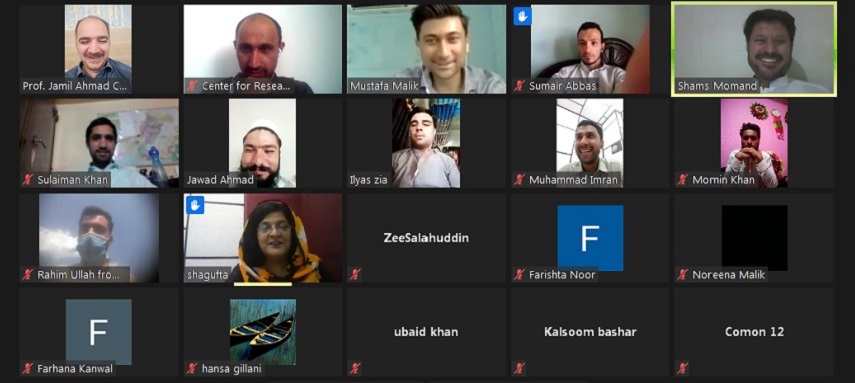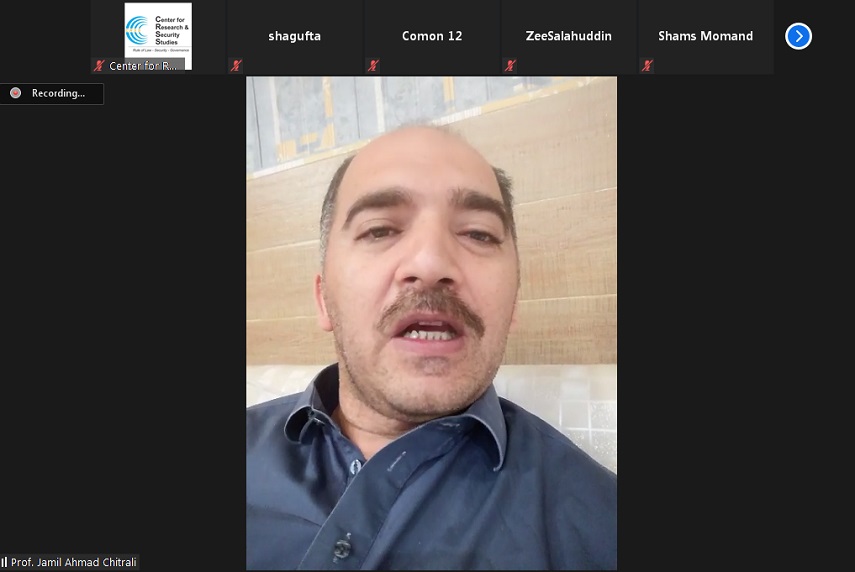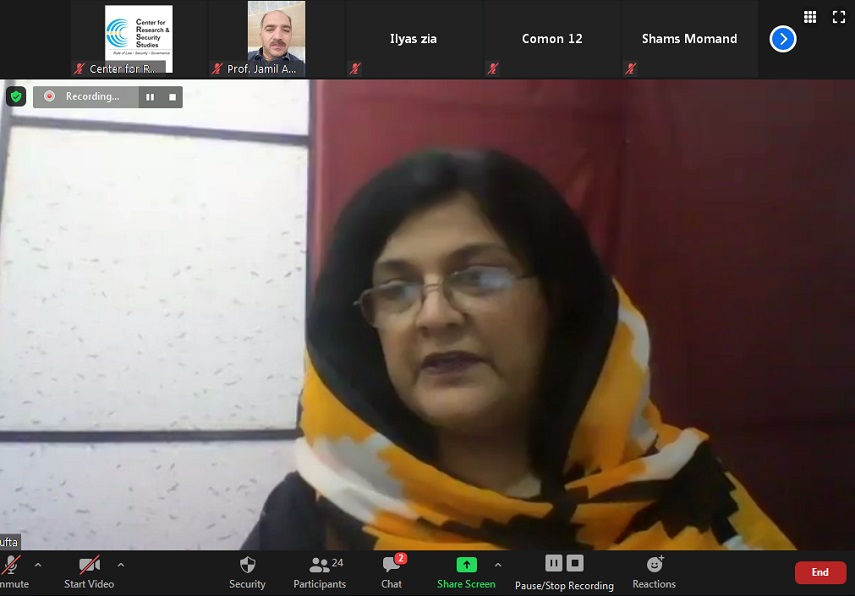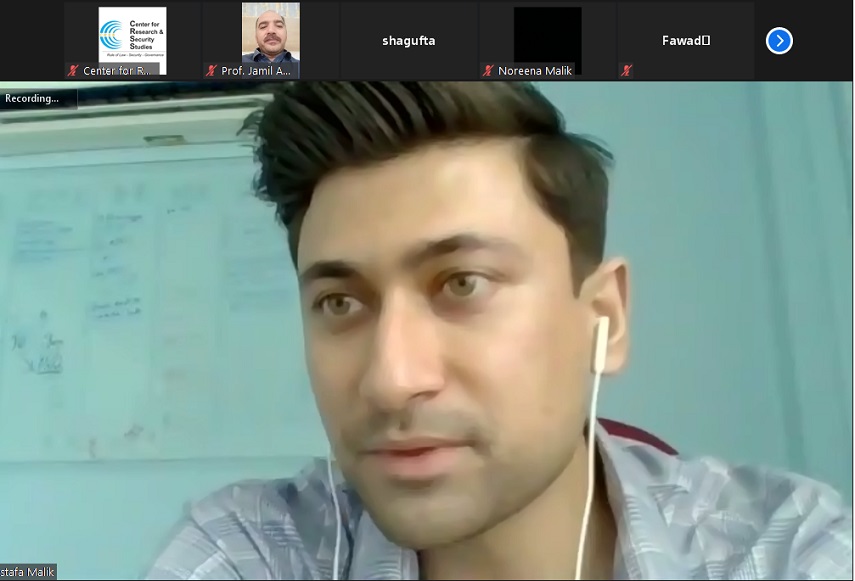The latest rounds of Ulasi Taroon Online Workshops featured Dr. Pervez Hoodbhoy, Nuclear Physicist and Renowned Academic, and Dr. Jamil Ahmad Chitrali, Institute of Peace and Conflict Studies, University of Peshawar, for discussion with around 40 youth leaders from different public and private sector universities across Khyber Pakhtunkhwa. The events were held as part of the Center for Research and Security Studies’ (CRSS) efforts to continue to cultivate the young through online conduits for communication, in the absence of physical platforms of youth engagement and development.
In the fifth round, Dr. Pervez Hoodbhoy discussed the Innovation in Education and Social Cohesion and noted that the quality of education in the country must be of a most critical concern to those at helm of the educational policy and it should be measured up to the international standards. It doesn’t merely require increased financial allocation for the sector but careful consideration of the issues that concern the educational needs of the country.
The teachers as gatekeepers of the society should be cognizant of their onus and be acquainted with the broader purpose of education as it means much more than the achieving quantitative milestones. However, such quantitative benchmarks of success in education are contrary to the global standards, where education means open-mindedness, and critical thinking and inquiry skills as prerequisites to create to new knowledge, and not just limited to securing good marks. Therefore, both quantitative and qualitative indicators better indicate as to how efficient and inclusive the system.
The most crucial period is early years education as students are highly receptive to new ideas in their formative period. Gone are the days of one-to-many lectures as they are not conducive to active learning in the class. We must encourage asking questions in the class to develop future leaders.
We have such an overwhelming focus on English that all other languages are being marginalized. While English as a medium of communication becomes inevitable at a higher education level, however, for basic education, we should use languages that children are most familiar and connected with. It is also important because for children to learn a foreign language, it is essential that they should have a thorough grounding in their mother tongue as that is essential to activate the language mechanism in a young child’s brain. As a result of the language dilemma, neither teachers not students have even a single language that they claim to be their forte. Our salvation lies in devising a mother tongue-based multilingual education programme at the primary level.
The distance learning through online conduits for communication is though inevitable in the covid-19 times and increasingly becoming a new norm but it is the way forward for education and will help making the much needed transformation for the future of youth development. The earlier we adapt, the better we serve in the best interest of country’s present and future generations.
We should make the most of infinite treasures of knowledge available on world wide web. Only by developing love for and connecting with knowledge base, can we have our students to make the most of it and that is the purpose of teaching, not rote learning.
We should promote social education to cultivate respect, tolerance and social cohesion perspectives in the society.
In the sixth round, Dr. Jamil Ahmad Chitrali, discussed COVID-19, Unity and Hope and underscored that there are always opportunities in crises and COVID-19 is no different to use it to strengthen our unity and social cohesion. Unity is not about seen alike, similarities and homogeneity and but understanding, mutual trust, respect for diversity and equality and equal opportunities for social mobility.
Despite its devastating effects, the COVID-19 brought us closer to the people who matter the most in our lives, either with family members during home isolation or friends through online fora, and helped learning to strike a balance between personal and professional affairs.
Technology and digital space can serve as both a window of opportunity and or a source of distraction and COVID-19 helped us optimally utilize its uses while ensuring maximum productivity. The ongoing crises is also an opportunity to exhibit social cohesion; forming cooperation mechanisms, shared goals and undertaking concerted efforts to address the issues of broader communal concern. It has also helped the online audiences especially youth realize to use of online fora to uphold the accountability mechanisms, and for political participation.
As witnessed historically, the rumors-based misconceptions can add fuel to the fire in the uncertain situations like COVID-19, and thus we should be wary of the repercussions and think critically as responsible citizens. Internationally, it is also envisaged to foster partnerships, change development priorities, and increase stakes for peace.
We are thankful to CRSS’s Ulasi Taroon for playing such a positive role in youth leadership development by always providing opportunities key to hone the talents and potential of the young, and mutual experience sharing. This is how we learn and grow.
About Ulasi Taroon:
Ulasi Taroon is a counter radicalization initiative of CRSS that aims to address the radicalization challenges and extremist ideologies and foster social cohesion in KP through a discourse anchored in the core constitutional values. The endeavors aim cultivate and sensitize the target groups in these core values highlight the criticality of abiding by these concepts – such as adherence to rule of law, primacy and sanctity of constitution, equal citizenry, respect for fundamental human rights, tolerance for diversity and different opinions, inclusive democracy and good governance – as a measure of fostering social cohesion and peaceful co-existence.






